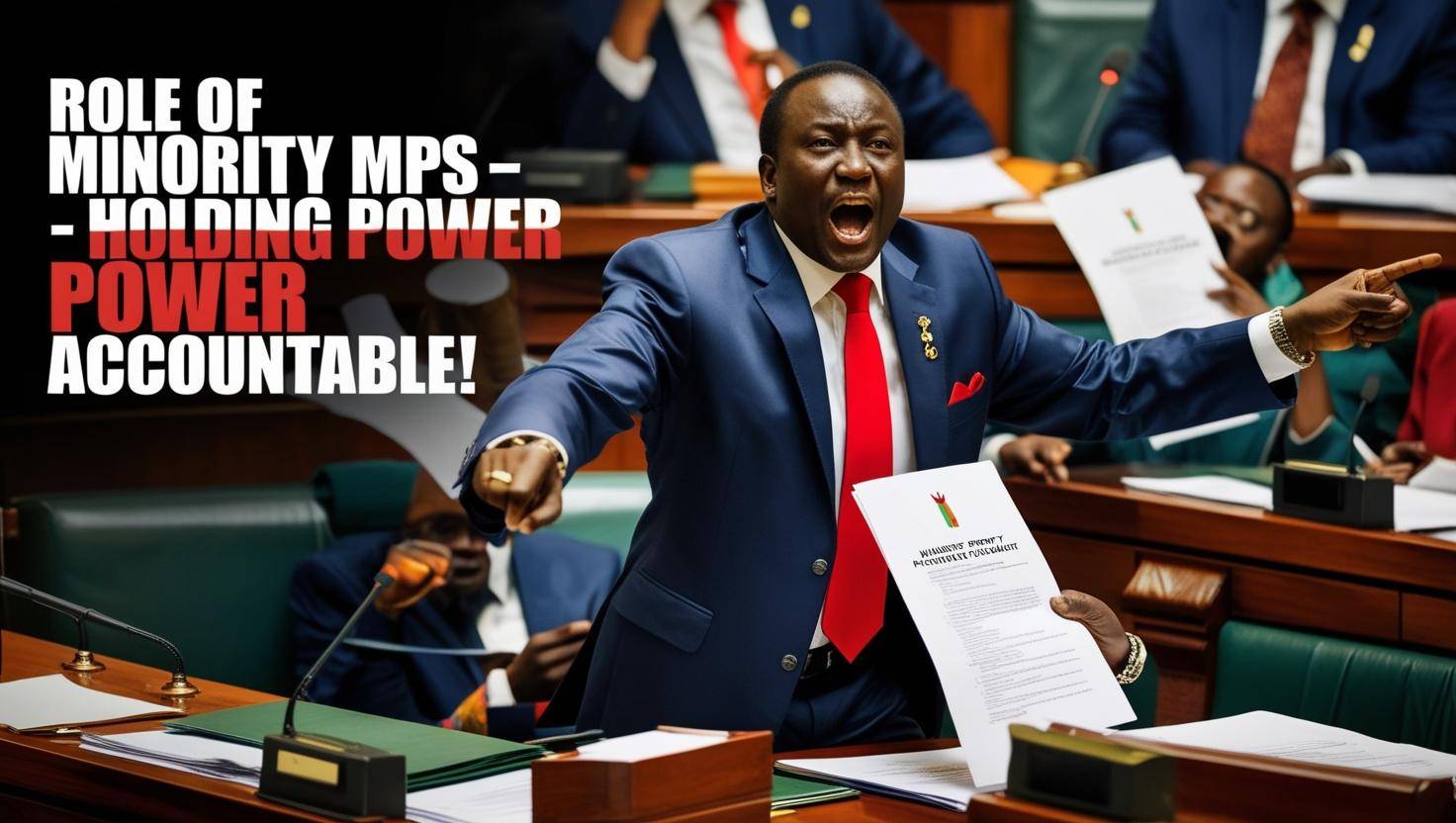Introduction
The Parliament of Ghana is a key institution in the country’s democratic governance, playing a vital role in lawmaking, oversight, and representation. Within this legislative body, Members of Parliament (MPs) are categorized into two main groups: the Majority and the Minority. While the Majority forms the government, the Minority plays a crucial role in ensuring accountability, transparency, and the protection of citizens' interests.
In this article, we will explore the responsibilities of Minority Members of Parliament (MPs) in Ghana, their role in the legislative process, and how they contribute to good governance.
Who Are the Minority Members of Parliament?
Minority MPs in Ghana are those who belong to political parties that do not have the majority of seats in Parliament. The party with the highest number of seats forms the Majority, while the party or coalition with fewer seats constitutes the Minority.
The Minority is usually led by a Minority Leader, who is supported by a Deputy Minority Leader, a Minority Chief Whip, and other ranking members of various parliamentary committees. Their collective responsibility is to offer checks and balances to the ruling government.
Key Responsibilities of Minority MPs in Ghana
1. Holding the Government Accountable
One of the primary responsibilities of Minority MPs is to hold the government accountable for its actions. This involves:
Questioning government policies and expenditures
Challenging the executive on decisions that may not be in the public’s interest
Calling for transparency in the use of state resources
Ensuring that the government abides by constitutional provisions and legal frameworks
Through parliamentary debates, press conferences, and public engagements, Minority MPs act as a watchdog to prevent abuse of power by the government.
2. Legislative Duties
As legislators, Minority MPs actively participate in the lawmaking process. Their contributions include:
Proposing new bills and amendments – Minority MPs can introduce private members' bills or propose changes to government-sponsored bills to make them more effective.
Debating policies – They scrutinize bills before Parliament, ensuring they align with the national interest.
Blocking unfavorable laws – If a proposed law does not benefit the majority of citizens, Minority MPs can use their influence to challenge or oppose it.
3. Budgetary Oversight
The Minority in Parliament plays a critical role in reviewing and approving the national budget. Their role includes:
Scrutinizing budget allocations to ensure funds are used efficiently
Advocating for fair distribution of resources across different regions
Highlighting budgetary discrepancies and wasteful spending
Pushing for increased funding in key sectors such as health, education, and infrastructure
4. Advocacy for Constituents’ Interests
Each MP represents a specific constituency, and Minority MPs are expected to:
Advocate for the needs of their constituents in Parliament
Push for infrastructural projects such as roads, schools, and hospitals
Address concerns related to employment, economic development, and social welfare
Engage with government agencies to facilitate development in their constituencies
Minority MPs also serve as a voice for marginalized communities and minority groups in the country.
5. Participating in Parliamentary Committees
Minority MPs serve on various parliamentary committees that focus on specific areas such as finance, education, health, and security. These committees:
Conduct investigations into government activities
Provide recommendations on policies and laws
Ensure government agencies operate within legal and ethical standards
Through committee work, Minority MPs contribute significantly to policy-making and governance.
6. Promoting Democratic Governance and Human Rights
A democratic government thrives when there is a strong opposition that challenges undemocratic practices. Minority MPs are at the forefront of defending democratic principles by:
Fighting against corruption and misuse of power
Supporting press freedom and freedom of speech
Advocating for fair elections and political inclusivity
Protecting human rights and ensuring justice for all citizens
7. Engaging the Public and Media
To ensure government accountability, Minority MPs frequently engage with the media and the public. They:
Organize press briefings to highlight national issues
Use social media and other platforms to communicate their policies
Mobilize public support for important issues such as constitutional reforms and governance changes
8. Strengthening Parliamentary Diplomacy
Minority MPs also represent Ghana in international parliamentary forums, conferences, and diplomatic engagements. Their participation helps:
Strengthen Ghana’s relationship with other countries
Exchange legislative best practices with foreign counterparts
Promote Ghana’s interests on global platforms
9. Offering Alternative Policies
The Minority is not just about criticizing the government; they also provide alternative policies and solutions. This includes:
Drafting alternative budgets
Suggesting economic policies to improve livelihoods
Proposing reforms in key sectors like education, healthcare, and agriculture
By offering well-researched alternatives, the Minority contributes to national development and ensures citizens benefit from better governance.
Challenges Faced by Minority MPs
While Minority MPs play a vital role in Ghana’s democracy, they face several challenges, including:
Limited influence – Since they do not control Parliament, their motions and bills may be blocked by the Majority.
Political pressure – Some Minority MPs face intimidation or political backlash when they challenge the government.
Resource constraints – Limited access to government resources can make it difficult for them to implement development projects in their constituencies.
Public expectations – Many citizens expect their MPs to deliver physical projects, even when MPs do not control national resources.
Media bias – Some media houses may favor the ruling party, limiting coverage of Minority MPs' activities.
Conclusion
Minority Members of Parliament in Ghana play a crucial role in strengthening democracy, ensuring government accountability, and representing the interests of their constituents. Their responsibilities go beyond merely opposing the government—they contribute to legislative processes, budgetary oversight, human rights advocacy, and policy-making.
Despite the challenges they face, a strong and active Minority in Parliament is essential for a functional democracy. By holding the government accountable and providing alternative solutions, they help shape Ghana’s governance and development.
As citizens, it is essential to support and engage with both Majority and Minority MPs to ensure that Parliament effectively serves the nation’s interests.


